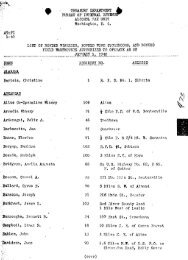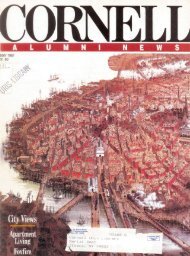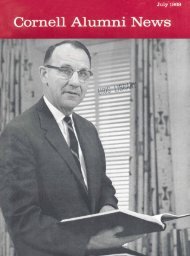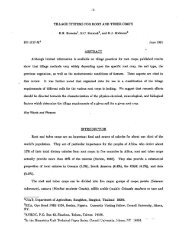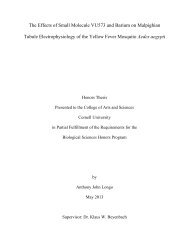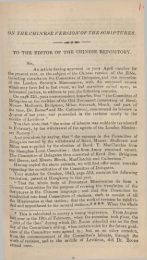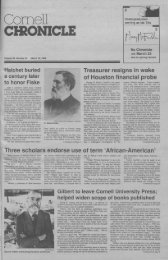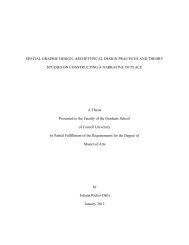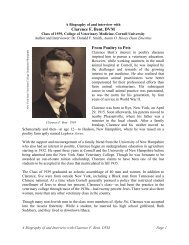1/1 - eCommons@Cornell - Cornell University
1/1 - eCommons@Cornell - Cornell University
1/1 - eCommons@Cornell - Cornell University
- No tags were found...
You also want an ePaper? Increase the reach of your titles
YUMPU automatically turns print PDFs into web optimized ePapers that Google loves.
from their patients, and that according<br />
to Hippocrates, physicians should<br />
have a primary interest in caring for<br />
sick people.<br />
"Yeah, but, like, wasn't Hippocrates<br />
more of a medical philosopher?<br />
I mean, nobody could cure diseases<br />
back then, right?" was her reply.<br />
I wasn't expecting such a harsh<br />
indictment of the father of modern<br />
medicine, the first doctor to understand<br />
opium addiction and to recognize<br />
the nature of epidemics like<br />
malaria. After all, Hippocrates wrote<br />
most of what the earliest medical<br />
schools taught.<br />
"Γm majoring in chemistry so I<br />
can get into an MD/PhD program,"<br />
proudly proclaimed another budding<br />
chemistry major. He'd arrived at<br />
<strong>Cornell</strong> with advanced placement in<br />
several subjects, and was racing<br />
through our curriculum at an accelerated<br />
pace.<br />
I asked what sort of medicine he<br />
wanted to practice. "Academic," was<br />
all he said.<br />
What about taking care of patients?<br />
I asked him.<br />
"I want to do research on molecular<br />
medicine," he countered, "not just<br />
clinical stuff."<br />
More premedspeak: I don't want<br />
to be around sick people. I thought of<br />
Galen, follower of Hippocrates, who,<br />
while ministering to the gladiators of<br />
the Roman Empire, not only developed<br />
a practical knowledge of anatomy<br />
but also happened to discover<br />
that arteries carried blood, not air,<br />
as his contemporaries thought. I remembered<br />
Avicenna, the 10th century<br />
Islamic "Prince of Physicians"<br />
who composed the first medical encyclopedia<br />
from extensive clinical<br />
notes he compiled while travelling<br />
throughout Persia. In his Arabian<br />
dispensary, the forerunner of modern<br />
drugstores, Avicenna formulated<br />
Pharmaceuticals out of gold, silver<br />
and other heavy metals to cleanse the<br />
blood of impurities. The giants of<br />
medical history, it seems, have been<br />
practicing "molecular" medicine and<br />
treating sick people for at least a<br />
thousand years.<br />
Although many of today's premeds<br />
profess commitment and idealism,<br />
70 percent still expect to be<br />
specialists, disdainful of the primarycare<br />
providers around whom our<br />
healthcare system is being reorganized.<br />
What words of advice might<br />
history's legendary physicians offer<br />
these aspiring young doctors as they<br />
enter modern medical practice? What<br />
would Hippocrates, etal. have to say<br />
about healthcare reform, about physicians'<br />
associations and hospital<br />
conglomerates and managed competition?<br />
Five hundred years ago, Phillipus<br />
Aureolus Threophrastus Bombastus<br />
von Hohenheim, who called himself<br />
Paracelsus (literally, "above Celsus"<br />
the renowned first century Roman<br />
doctor), presided over a similar revolution<br />
in healthcare. Traveling<br />
throughout Europe and Asia Minor,<br />
the itinerant physician boldly challenged<br />
the medieval teachings of<br />
Hippocrates, arguing that diseases<br />
were caused by specific external<br />
pathogens, not by vague imbalances<br />
of "humors" in the body. Although<br />
he was a successful surgeon, much<br />
in demand by the wealthy aristocracy,<br />
he shunned the attendant political<br />
clout and espoused the peasant<br />
lifestyle.<br />
As a young professor of medicine<br />
in Basel, the activist Paracelsus once<br />
burned Avicenna's encyclopedia in a<br />
public bonfire, and used medical<br />
rounds as a forum to attack the profiteering<br />
and pomposity of incompetent<br />
doctors. That "the high colleges<br />
managed to produce so many high<br />
asses" reflected the depth of Paracelsus's<br />
disdain for the prevailing<br />
medical establishment.<br />
Today, the prevailing premedical<br />
mentality is evident in the<br />
culture and language of premedspeak.<br />
Most are shocked<br />
and puzzled by the unorthodox<br />
background and behavior of<br />
history's greatest physicians, doubting<br />
that any of them would now be<br />
accepted into medical school. Of<br />
Paracelsus's bombastic style, one remarked,<br />
"He certainly doesn't sound<br />
like a caring and compassionate physician."<br />
Another was struck by the<br />
similarity between Galen's experience<br />
in Roman times and modern<br />
inner-city emergency rooms. "Good<br />
summer work experience," he<br />
quipped. "But today's med schools<br />
would still want to see Galen's<br />
MCAT scores."<br />
JUNE 1994<br />
13<br />
Maybe instead of fretting over<br />
healthcare costs, we should be more<br />
worried about the doctors who will<br />
practice the reformed healthcare of<br />
the future. The late Lewis Thomas,<br />
a distinguished medical doctor and<br />
superb writer who was long affiliated<br />
with <strong>Cornell</strong>'s Medical College and<br />
Sloan-Kettering Research Institute,<br />
understood the broad public appeal<br />
of the physician's ability to cure. But<br />
he also knew a few things about tending<br />
to the sick to ease their pain, and<br />
especially about bedside manner—<br />
things he tried to pass on to young<br />
doctors in his books. inLives of a Cell<br />
he wrote, "The great secret, known<br />
to internists and learned early in<br />
marriage by most internists' wives,<br />
but still hidden from the general<br />
public, is that most things get better<br />
by themselves. Most things, in fact,<br />
are better by morning."<br />
And what if things don't get better?<br />
It may be, as Thomas suggests,<br />
that we are all destined to die according<br />
to some preordained schedule,<br />
doctor's orders notwithstanding. I<br />
cling to this notion as legions of prospective<br />
premed, predental and MD/<br />
PhD students muddle through introductory<br />
organic chemistry. Perhaps<br />
one of my advisees put it best this<br />
year. We were arguing about the<br />
changing stature and lifestyle of the<br />
primary care physician, an occupation<br />
whose ranks he desperately<br />
hopes to join. Are you expecting to<br />
make big bucks? I asked him. You<br />
know, you won't have much autonomy.<br />
His reply: "At least the job<br />
will pay reasonably well."<br />
That worries me.<br />
—Bruce Ganem<br />
TUNE YOUR BODY, FREE YOUR SPIRIT.<br />
Row on Alden. We offer complete packages for open water rowing.<br />
Call 1-800-477-1507 for our free catalogue of rowing products.<br />
Alden Ocean Shells, Inc.<br />
Experts In Open Water Rowing For Over 20 Years<br />
P.O. Box 368, Eliot, Maine 03903



